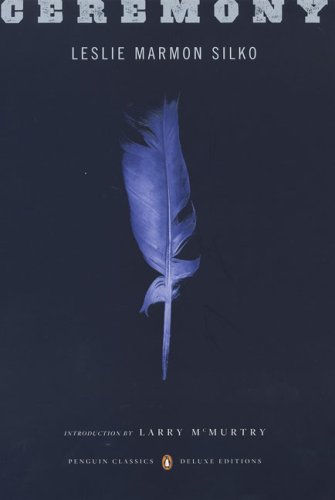
A harrowing story of post-traumatic stress and a young man trying to identify with two cultures, Ceremony by Leslie Marmon Silko is a modern classic.
In part because I want to make a trend of authors with three names and in part because I feel I missed out on a huge literary cultural reference in high school, I finally picked up Leslie Marmon Silko’s Ceremony. This is the powerful and heart-wrenching story of two wars: the war between the U.S. and Japan in the Pacific Theatre, and the war between white culture and Indian culture in the Arizona high desert. Tayo, a mixed race soldier, is the victim of both.
Tayo was born of a Laguna Indian mother and an unknown white father, and as a “mixed breed” boy, the product of a shameful liaison, he is the target of ridicule from his peers and shunning from his guardians. Only his cousin Rocky accepted him as a family, called him “brother.” Tayo’s idolization of Rocky leads him to enlist, and the two of them are shipped to the jungles of the Philippines to fight the Japanese. When Tayo returns to his Laguna community alone, he falls farther into isolation, now hounded by survivor’s guilt and shell shock.

Bought this copy for a dollar in a tiny library in Rhode Island, and the markings are like an anthropological find. The first few pages show the signs of a zealous reader. The rest of the book shows the sign of a reader who either ran out of steam or ran out of ink.
Ceremony tells the story of the tradition of storytelling:
I will tell you something about stories . . . They aren’t just entertainment. Don’t be fooled. They are all we have, you see, all we have to fight off illness and death.
You don’t have anything
if you don’t have the storiesThe story was all that counted
OK, so she might be a little heavy handed with the storytelling. Silko’s already lyrical prose is regularly interrupted with folktales and legends in the format of songs or poems–line breaks, imagery, and ancient names that Tayo finds comfort in. Tayo goes to these storytelling roots for more than nostalgia. Through them, he finds solace and cleansing. Through them he performs a ceremony of lost culture that purifies him of a culture of war, of the ceremonies of drunkenness, brutality, bitterness, and murder.
When Tayo embarks on a journey to round up a vagrant herd of his Uncle Josiah’s Mexican cattle to rebuild the family ranch. He slowly learns–through the help of Old Betonie (and several well-placed, catalyzing events)–that he has the power to write his own story, a new continuation of a story that can never end. (I’m having flashbacks to “Lamb Chops” here.)

The cattle Tayo chases are made to live in the mountains and the desert. They are wild and lead Tayo all across the land that used to belong to his people. (Photo by Will Borden)
Now, anyone who knows me knows I’m big on war novels, but Ceremony is something different. This is the aftermath of war. It’s messy and depressing. Even the disillusionment on the battlefield in books like All Quiet on the Western Front or A Farewell to Arms is readable compared to Tayo’s long suffering afterwards. I wouldn’t say this book is easy to read, but it’s beautiful. Silko’s novel reminds me a little of John Steinbeck’s Tortilla Flat–the story of men after war, especially marginalized men. Men of racial minorities who treated like heroes when they’re in their uniforms, when the threat of alien invasion is imminent. When the threats of fascists and Nazis and Japanese Imperialists are removed, the Indians become the enemy again. We always have to have our enemy.